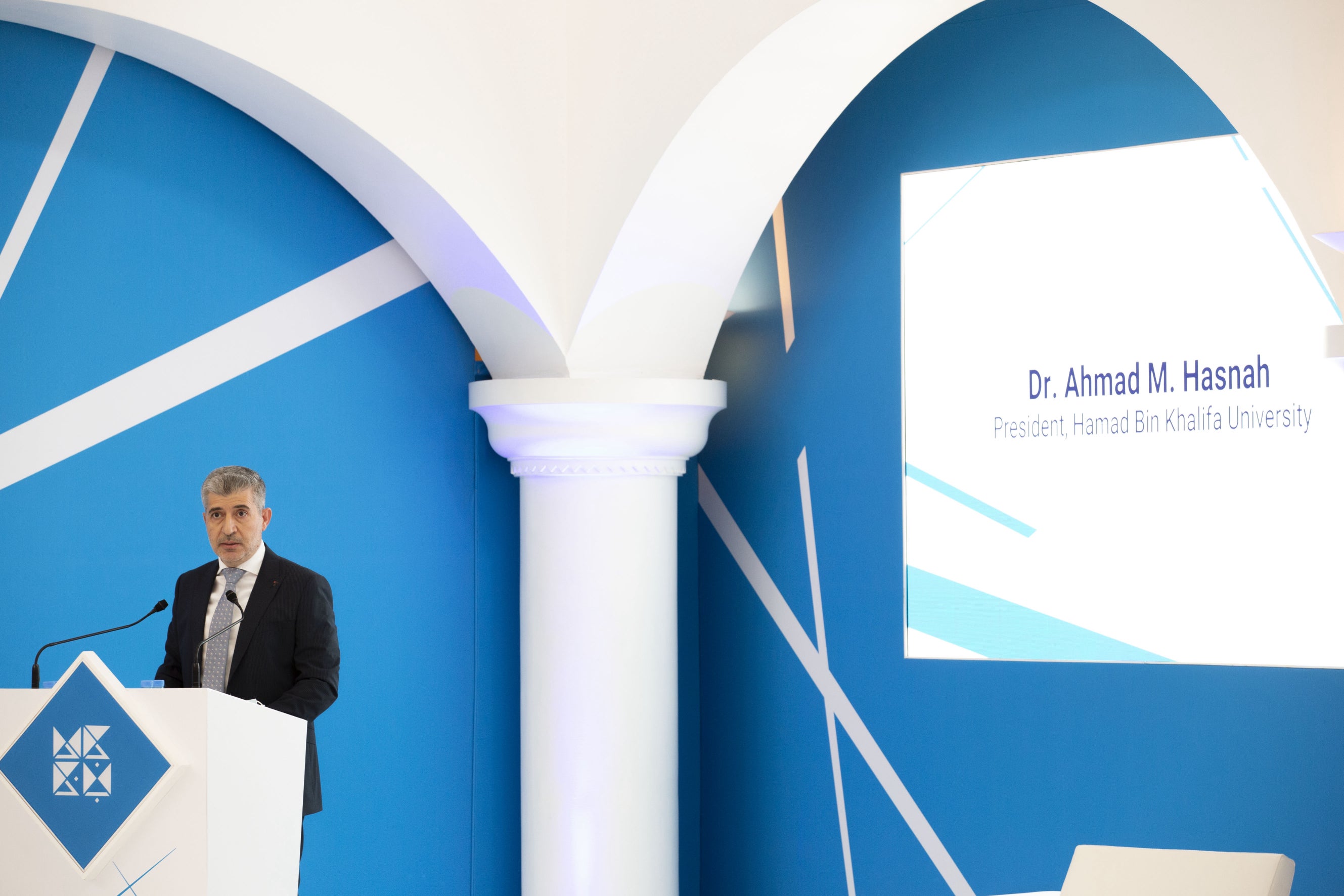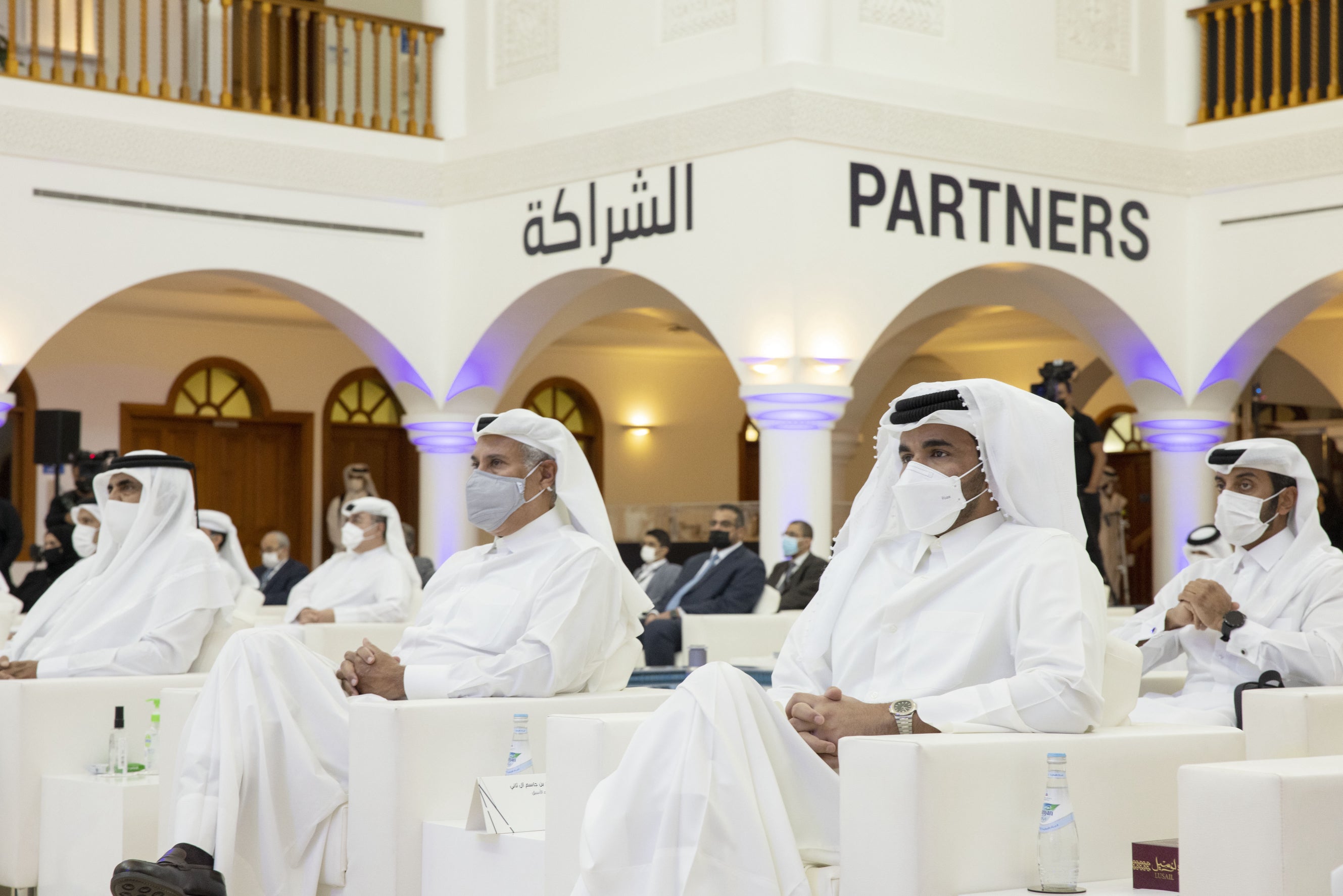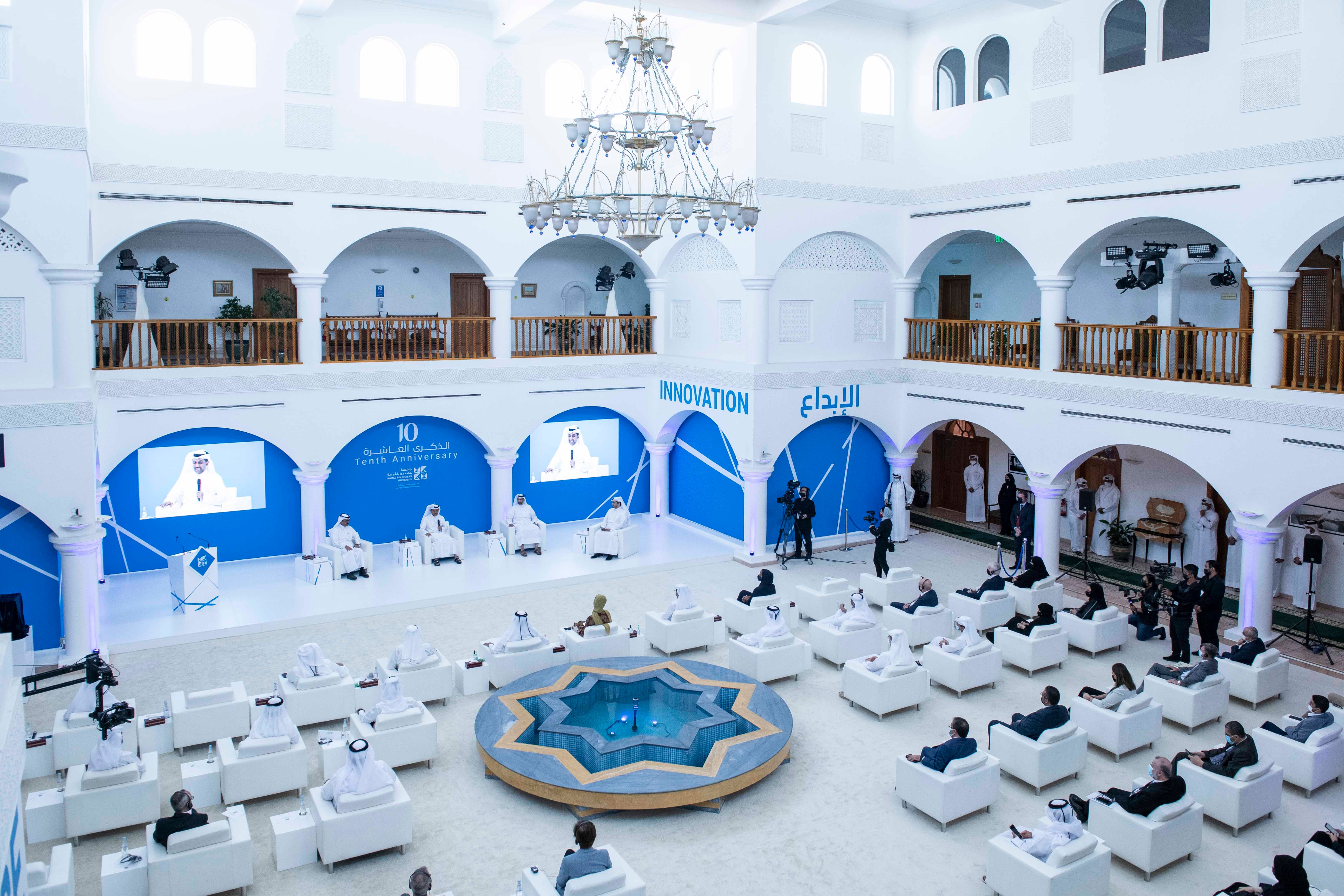
Marking 10 years since its founding as a graduate-focused, research-driven university, Hamad Bin Khalifa University (HBKU) has launched a new initiative - HBKU Dialogues - that reaffirms its role as a Qatari institution committed to engaging the wider community.
“We remain deeply connected to our society by initiating meaningful conversations; we have launched the HBKU Dialogues to mobilize and bridge our research efforts and our community outreach initiatives,” said Dr. Ahmad M. Hasnah, HBKU President, on the occasion of the launch.
The inaugural HBKU Dialogues on October 27 focused on the theme ‘Investment in Scientific Research and its Impact on Sustainable Development and a Knowledge-Based Economy’. A high-level panel with HE Sheikh Dr. Faleh bin Nasser Al-Thani, Minister of Environment and Climate; Dr. Hassan Al-Derham, President of Qatar University; and HE Dr. Mohammed bin Saleh Al Sada, former Minister of Energy and Industry, exchanged insights into the challenges and opportunities of achieving sustainable development and a knowledge-based economy.
HBKU’s role
Universities, colleges, and other higher education institutions (HEIs) have a crucial role to play in the achievement of the 2030 Sustainable Development Goal (SDG) Agenda, and are mentioned specifically under SDG 4 on quality and inclusive education.
Founded on the values of innovation and transformation, HBKU’s efforts, through teaching and learning, research output, and other initiatives, have demonstrated that the influence of HEIs extends across all SDGs. HBKU is recognized as a uniquely Qatari hub for innovative research that creates knowledge, builds capacity, and transforms society. Over the decade, HBKU has strived to develop world-class, integrated academic programs, and national research capabilities that can propel Qatar’s knowledge-based economy and shape novel solutions to sustainability and other challenges.
Discussion highlights
The high-level discussion, moderated by HBKU alumnus, Mana Al-Ansari, was live streamed to a public audience.
HE Sheikh Dr. Faleh bin Nasser Al-Thani, addressing a question on how scientific research and higher education can contribute to addressing labor market challenges and supporting government institutions in achieving this, said: “The Ministry of Environment and Climate Change is a key partner for all universities and research institutes. Their role has been essential in our work to develop the Environment and Climate Change Strategy that has been approved and will be announced tomorrow. This strategy has covered all plans and areas in cooperation with universities, including HBKU. Qatar has paid close attention to the field of renewable energy, and the government has made great strides in establishing new renewable energy plants that will be operational in the near future.”
 He expanded further: “In the field of waste management, the ministry is cooperating with many universities and research institutes. There are major challenges facing the oil and gas industry, as well as challenges in relation to the optimal use of land, water and energy. These are addressed through innovation, research and development, and there are many projects underway. We extend our thanks to Qatar National Research Fund, which plays a major role in supporting many research projects r hi elated to the environment, waste management and renewable energy.”
He expanded further: “In the field of waste management, the ministry is cooperating with many universities and research institutes. There are major challenges facing the oil and gas industry, as well as challenges in relation to the optimal use of land, water and energy. These are addressed through innovation, research and development, and there are many projects underway. We extend our thanks to Qatar National Research Fund, which plays a major role in supporting many research projects r hi elated to the environment, waste management and renewable energy.”
His Excellency Dr. Hassan Al-Derham responded to a question on the opportunities that can be leveraged from an HBKU-Qatar University partnership, as well as the impact of this cooperation on society and the nation’s economy through their combined efforts in research and academia. “I believe that universities have a key role to play in reinforcing the need for knowledge-based economies, and I believe that partnerships between educational institutions will help achieve this critical goal. Qatar University was founded to be a top-tier academic institution and HBKU was established to help address national challenges through state-of-the-art research. I do believe that HBKU can synergize its efforts, through its research institutes and graduate programs, to help achieve this goal. At Qatar University, our strength lies in numbers, since we have 25,000 enrolled students. I believe it will be very beneficial to link and connect outstanding QU graduates with their counterparts at HBKU. When we adopt and nurture their achievements and talents, we can use our combined efforts to further develop human talent and build a knowledge-based economy.”
He added: “I believe that both universities are agile and flexible. These are important qualities to have in the field of higher education, especially in light of the rapid developments that we are witnessing through globalization, the Fourth Industrial Revolution, and the COVID-19 pandemic. Agility is inseparable to judicious decision-making. It is a quality that will enable universities to tackle challenges and succeed in creating opportunities out of those challenges. I believe that our programs can form the basis for a true partnership, as we also collaborate with the industrial and governmental sectors.”
 Dr. Al-Derham expressed his happiness with the anticipated launch of the Qatar Environment and Climate Change Strategy and the possibilities associated with it, stressing his belief that this strategy constitutes a main theme for universities looking to advance their scientific research.
Dr. Al-Derham expressed his happiness with the anticipated launch of the Qatar Environment and Climate Change Strategy and the possibilities associated with it, stressing his belief that this strategy constitutes a main theme for universities looking to advance their scientific research.
His Excellency further praised the announcement of the launch of HBKU’s Endowment Fund and stressed that the fund will help HBKU enhance the sustainability aspects of its work.
His Excellency Dr. Mohammed bin Saleh Al-Sada, the former Minister of Energy and Industry, outlining his vision on ways to enhance cooperation between educational and government institutions in support of a diversified Qatari economy and a knowledge-based society, said: “Scientific research is a fundamental pillar now in economies, whether economics of production or economies of services. The world is witnessing a steady development in the field of scientific research.
“No educational or research institution, regardless of its successes, can stand in its place after its successes, as it must continue to face challenges in both its operational and developmental aspects. In their efforts to enhance their efficiencies, institutions need to combine all efforts, and this can only be achieved through continuous research.
“The other aspect that the industrial or service sectors need is development, which is a futuristic aspect, seen through new and competitive inventions.”
His Excellency added: "We are currently witnessing the growth of cooperation between various sectors, and I believe that HBKU has passed through the initial stages, and can now be seen as a well-established entity, despite its short life.
“The research conducted by the university is characterized by looking to the future. If we were to examine all the existing disciplines, we will find that they are very forward-looking disciplines, such as genomics and nanosciences, and even human and digital studies. That outlook is what we really need.”
Dr. Al-Sada continued: "Sharing research with other economic sectors has become an urgent necessity, not a matter of luxury or choice. The educational and research sectors can rely with complete confidence on the existing research capabilities in Qatar. Research conducted over the past 10 years reveals that the output of scientific research in Qatar has increased by more than seven times, in addition to the high quality of research, all of which are published and internationally refereed, and this is a very big indicator that makes us feel proud.”
The former Minister of Energy and Industry concluded his speech by saying: “One of the most important factors is the apparent decrease in costs during the period that witnessed an increase in scientific production and research publications, and this is natural, because the costs associated with the beginning of the growth can always be substantial. We are proud of HBKU, as we are proud of other universities in Qatar, but this university has its own unique characteristics and we know that we can rely on it in the future."
HBKU Dialogues: future engagement
With multiple initiatives and platforms being planned under “HBKU Dialogues”, the HBKU and wider Education City community of students, researchers, and faculty, will have opportunities to engage and share perspectives on issues of global relevance that have national impact.
HBKU is a key player within Qatar Foundation’s unique ecosystem and multiversity initiative that enriches the learning and success of students across Education City. In highlighting the university’s expertise in niche areas to the wider society, this new initiative will amplify HBKU’s academic and innovative research that creates knowledge, builds capacity, and transforms society.





